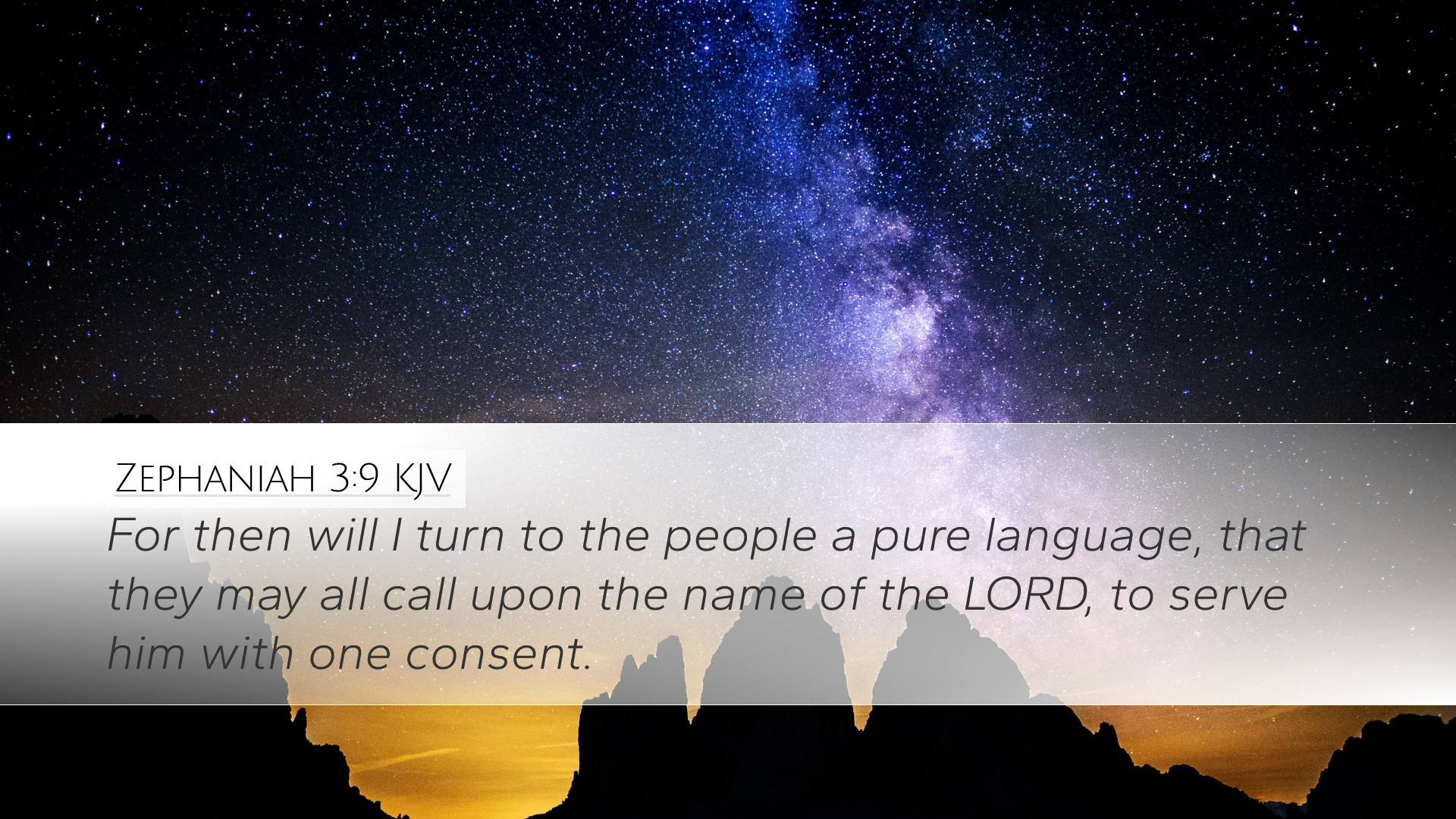Old Testament
Genesis Exodus Leviticus Numbers Deuteronomy Joshua Judges Ruth 1 Samuel 2 Samuel 1 Kings 2 Kings 1 Chronicles 2 Chronicles Ezra Nehemiah Esther Job Psalms Proverbs Ecclesiastes Song of Solomon Isaiah Jeremiah Lamentations Ezekiel Daniel Hosea Joel Amos Obadiah Jonah Micah Nahum Habakkuk Zephaniah Haggai Zechariah MalachiZephaniah 3:9
Zephaniah 3:9 KJV
For then will I turn to the people a pure language, that they may all call upon the name of the LORD, to serve him with one consent.
Zephaniah 3:9 Bible Commentary
Commentary on Zephaniah 3:9
The verse Zephaniah 3:9 states:
"For then I will turn to the people a pure language, that they may all call upon the name of the Lord, to serve him with one consent."
Contextual Background
Zephaniah, a prophet during the reign of King Josiah in Judah, speaks directly to the judgment and restoration that God will bring upon His people. The themes of divine judgment interspersed with grace permeate this book, particularly as it outlines the consequences of sin while offering hope for reconciliation.
Insights from Matthew Henry
Divine Transformation: Matthew Henry emphasizes that God's promise to turn to the people indicates a transformation in the spiritual state of Judah. This change is significant, suggesting that there will be a purifying work of transformation that affects both language and worship.
Pure Language: Henry interprets "pure language" as a reflection of the clarity and truth of God’s revelation. This isn't merely about communication; it's about a heart aligned with divine will. A pure language indicates that the people will cease their idolatrous practices and speak in a way that glorifies God.
Unity in Worship: According to Henry, having "one consent" points to communal worship and unity among the believers. This is a call to collective identity in the worship of the one true God, which starkly contrasts with the disunity seen during periods of spiritual decline.
Insights from Albert Barnes
The Nature of Restoration: Albert Barnes highlights the significance of the "then" at the beginning of the verse. This indicates a future fulfillment tied to the judgment previously pronounced. There is a hallmark of hope that after afflictions, God will restore His people, not only forgiving but also providing a new means of worship.
Calling Upon the Lord: Barnes discusses the importance of calling upon the name of the Lord, suggesting that this denotes a heartfelt plea for help and guidance. This act of calling is a hallmark of genuine faith and a sign of returning to the Lord from a state of neglect or rebellion.
Common Language of Faith: Barnes suggests that the "pure language" can also be seen as a metaphor for the simplicity and purity of the Gospel message. Just as the early church spread the message in unity, the restoration foretold in Zephaniah speaks to a future where God's truth is universally spoken and appreciated.
Insights from Adam Clarke
Prophetic Fulfillment: Adam Clarke provides a broader theological lens on this verse, asserting that the purification of language symbolizes the cessation of corruption and the beginning of a new, untainted era in the relationship between God and His people.
Divine Intent: Clarke interprets "I will turn to the people" as a divine initiative. God is the subject initiating restoration, suggesting that upon repentance, God actively engages with His people to renew them spiritually.
Worship and Service: Clarke notes that serving the Lord "with one consent" indicates a fervent collective spirit in worship. This echoes the call for unity in faith practices, aligning with Jesus’ teachings of love and fellowship amongst believers.
Theological Themes
- Repentance and Restoration: This verse underlines the biblical principle that genuine repentance leads to restoration. God’s willingness to extend grace illustrates His character as loving and merciful, ready to forgive and renew.
- The Power of Language: Language holds a significant place in relation to worship. A "pure" language suggests an absence of confusion and sin, reminiscent of the early church's experience in Acts where the Holy Spirit empowered the believers to proclaim God's truth in unity.
- Unity in Worship: The concept of serving God with "one consent" highlights the importance of community in faith practices. It signifies a shift from disparate beliefs to a unified doctrine rooted in the truth of God’s word.
- God's Sovereignty: The assurance that God will initiate this transformation speaks to His ultimate control over history and humanity. It reveals the certainty of His promises in the eschatological narrative of Scripture.
Conclusion
Zephaniah 3:9 serves as a profound declaration of hope for restoration and unity in worship. By asserting that God purifies His people, the verse encapsulates the transformative power of divine intervention. Understanding this scripture through the lenses provided by historical commentaries enriches both personal growth and collective worship experience.


